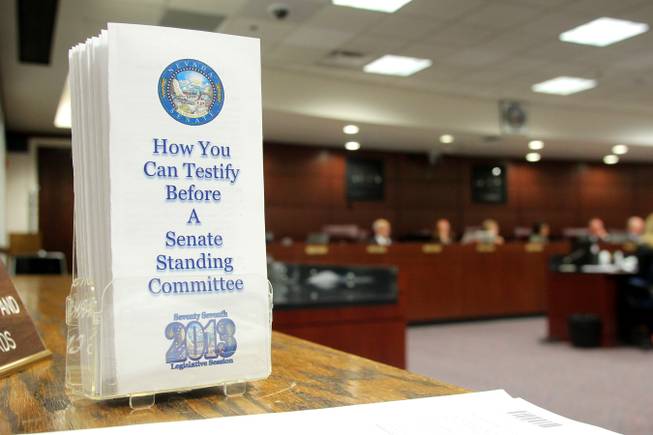
Sam Morris / Las Vegas Sun
A pamphlet with information on how to testify is seen in a Senate hearing room Friday, Feb. 8, 2013 during the 2013 legislative session in Carson City.
Tuesday, Feb. 12, 2013 | 2 a.m.
Sun coverage
There are dark caves and impenetrable labyrinths, and then there’s the Nevada Legislature.
It takes place 450 miles north of Las Vegas, and it's full of scheming lobbyists and wonky bureaucrats.
So, for those who scream, “Be the change you seek,” well, how do you do that in the Nevada Legislature?
Plenty of people are passionate about their communities, families, schools, health, jobs and other issues the Legislature addresses. Effectively translating that passion to a meaningful outcome is another story entirely.
But we're barely into the 120-day legislative session — still early enough to make a change in Carson City.
“If there’s something you’re worried about, now’s a good time to start,” said Sen. Ben Kieckhefer, R-Reno.
Here’s what activists, lobbyists and legislators say are the do’s and don’ts for the citizen wanting to make a change:
Get personal
These days, there are many ways you can follow the Legislature: watch hearings online, find your Assembly and Senate representation, track legislation, monitor the Legislature on Twitter, share your opinion about bills online and testify via video from Las Vegas.
But the best way to make your point may still be writing or calling the lawmaker who represents you.
“That personal contact specifically to the person who represents you is the best way to do it,” Kieckhefer said. “Then, be prepared, have a message, and explain why something is important to you and your life. But know what you want to say because you might not have a lot of time.”
Be respectful and clear, include a personal story to help your message resonate and remember to thank legislators for their time, said Ken Kraft, president of the North Valley Democratic Club.
Despite the power of lobbyists in Carson City, a personal story from a voter still carries weight.
“Any legislator who wants to be a legislator next session is much more worried about voters in their district than a well-heeled lobbyist who likely doesn’t live in their district,” said Laura Martin, communications director with the Progressive Leadership Alliance of Nevada.
Make a campaign contribution
Almost nobody gets elected without a little financial help, and donors are in a unique position when their candidate wins elected office.
“Money talks,” says Chuck Muth, president of Citizen Outreach, a conservative activist group. “It is distasteful, but it’s also reality. The reality is, the money does talk up there (in Carson City). They’ll be more likely to listen to what you say.”
A $5 contribution might not get you anywhere, but pooling resources in an advocacy group can be meaningful.
Even then, it’s not quid pro quo. You can buy access, but you cannot blatantly buy influence.
“You’re going to be more likely to get a meeting than someone who hasn’t provided a contribution,” said Tom Clark, a paid lobbyist at the Nevada Legislature.
Strength in numbers
Finding a group with similar interests or a similar political philosophy to your own can be an easy way to amplify your reach and voice at the Legislature.
For instance, Parent Leaders for Education, a Washoe County group hoping to expand into Clark County, formed during the past legislative session as a group of nonpartisan, nonprofit, education activists.
As a group, they have coordinated a legislative forum, sent personal letters to legislators from constituents and regularly met with legislators to build those all-important personal relationships.
“It’s Nevada, so you can ask your legislator to coffee and they’ll show up,” said Andrea Hughs-Baird, with Parent Leaders for Education.
An organization can keep an eye on what’s going on and let you know when you need to jump in with an email or a call to your Senate and Assembly representatives.
“It’s the job of the activist organizations to make it easy for citizens who have interest but don’t have time,” Muth said.
Hire a lobbyist
Many groups attend the Legislature for various advocacy days throughout the 120-day legislative session.
But it’s a sustained effort built through personal relationships that can really make a difference.
“It’s frequency,” said Hughs-Baird, whose group advocated last session every Wednesday at the Legislature.
Lobbyists, whether paid or unpaid, can build trust and rapport with legislators, and they are a daily, constant advocate for your issues. (Can’t find a personal lobbyist? Yet another reason to join a group.)
“Most access happens in the hallways,” Clark said. “That’s why we’re called lobbyists.”
An advocate constantly in the Legislature also can play defense for the issues you care about. There are plenty of procedural games lobbyists and legislators can play, and a bill is never quite dead until the Legislature concludes.
“As we saw last year, a lot of things got rammed through at the last minute, so it’s good to have a presence there,” Martin said.
What not to do
Passion for an issue and activism don’t guarantee success. There are plenty of ways to be ineffective or to dynamite your efforts to make a positive change.
Signing on to a form letter, the type that starts with “Dear Sir or Madam,” is a sure way to make no inroads with anybody.
There are 2,400 emails coming into the building every day, said Rick Combs, director of the Legislative Counsel Bureau, which manages the day-to-day operation of the Legislature.
Make yours stand out.
Trying to persuade legislators who already made up their mind is a waste of time, Muth said.
Another iffy bet is reaching out to a legislator who doesn’t represent you. A compelling story can still work, but legislators are more likely to respond and react to messages from their own constituents.
Also, remember the Golden Rule. Don’t be rude, Hughs-Baird said. Remember, you’re trying to make friends, not enemies.


Join the Discussion:
Check this out for a full explanation of our conversion to the LiveFyre commenting system and instructions on how to sign up for an account.
Full comments policy